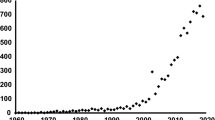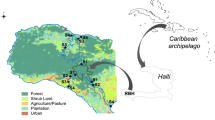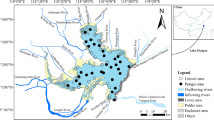Abstract
Short-term species succession, and long-term community development, of planktonic rotifer populations of the temperate zone and factors influencing species' abundance (ie., physical and chemical limitations, food and exploitative competition, mechanical interference competition, predation, parasitism) are described and discussed. The long-term development of plankton communities in three European lakes is described and the major events are discussed in relation to ecological interactions. Frequently, the shortcomings of our knowledge about population ecology and ecophysiology of rotifers prevent explanations of short-term and, especially, of long-term developments of these plankton organisms. The need for qualitative and quantitative observations in the field and in the laboratory over long periods becomes obvious.
Similar content being viewed by others
References
Bangerter, B., E. Böhlen & H. Fankhauser, 1980. Untersuchungen über das pelagische Phyto-, Rotatorien- und CrustaceenPlankton im Bielersee. Lizentiatsarbeit, Universität Bern, 193 Seiten.
Bernardi, de R. & E. Soldavini, 1976. Long-term fluctuations of zooplankton in Lake Mergozzo, Northern Italy. Mem. Ist. ital. Idrobiol. 33: 345–375.
Berner-Fankhauser, H., 1986. Populationsdynamik der Planktonrotatorien im Bielersee 1981/82. Unpubl. PhD. thesis, Univ. Bern, Switzerland, 88 pp.
Bogdan, K. G. & J. J. Gilbert, 1982. Seasonal patterns of feeding by natural populations of Keratella, Polyarthra, and Bosmina: Clearance rates, selectivities, and contributions to community grazing. Limnol. Oceanogr. 27: 918–934.
Bogdan, K. G., J. J. Gilbert & P. L. Starkweather, 1980. In situ clearance rates of planktonic rotifers. Hydrobiologia 73: 73–77.
Brandl, Z. & C. H. Fernando, 1978. Prey selection by the cyclopoid copepods Mesocyclops edax and Cyclops vicinus. Verh. int. Ver. Limnol. 20: 2505–2510.
Burns, C. W. & F. H. Rigler, 1967. Comparison of filtering rates of Daphnia rosea in lake water and in suspensions of yeast. Limnol. Oceanogr. 12: 492–503.
Carlin, B., 1943. Die Planktonrotatorien des Motalaström. Medd. Lunds Univ. limnol. Inst. 5: 256 pp.
Dokulil, M., 1979. Seasonal pattern of phytoplankton. In H. Löffler(ed.), Neusiedlersee. Limnology of a shallow lake in Central Europe. Dr. W. Junk by Publ., The Hague, Boston, London, Monogr. Biol. 37: 203–231.
Dokulil, M., 1984. Assessment of components controlling phytoplankton photosynthesis and bacterioplankton production in a shallow, alkaline, turbid lake (Neusiedlersee, Austria). Int. Revue ges. Hydrobiol. 69: 679–727.
Edmondson, W. T., 1946. Factors in the dynamics of rotifer populations. Ecol. Monogr. 16: 357–372.
Edmondson, W. T., 1960. Reproductive rates of rotifers in natural populations. Mem. Inst. ital. Idrobiol. 12: 21–77.
Edmondson, W. T., 1965. Reproductive rate of planktonic rotifers as related to food and temperature in nature. Ecol. Monogr. 35: 61–111.
Einsle, U., 1983. Die Limnologie des Mindelsees. Natur- und Landschaftsschutzgebiete Bad. -Würt. 11: 161–218.
Elliott, J. I., 1977. Seasonal changes in the abundance and distribution of planktonic rotifers in Grasmere (English Lake District). Freshwat. Biol. 7: 147–166.
Eloranta, P. V., 1982. Zooplankton in the Vasikkalampi pond, a warm water effluent recipient in Central Finland. J. Plankton Res. 4: 813–837.
Frank, V., D. Bosch & J. Ringelberg, 1985. Seasonal succession and population dynamics of Keratella cochlearis (Ehrb.) and Kellicottia longispina (Kellicott) in lake Maarsseveen I (Netherlands). Arch. Hydrobiol. 103: 273–290.
Fuller, D. R., R. S. Stemberger & J. E. Gannon, 1977. Limnetic rotifers as indicators of trophic change. J. Elisha Mitchell Scient. Soc. 93: 104–113.
Gilbert, J. J., 1980. Feeding in the rotifer Asplanchna: Behavior, cannibalism, selectivity, prey defenses, and impact on rotifer communities. In W. C. Kerfoot(ed.), Evolution and Ecology of Zooplankton Communities. The University Press, New England, Hanover (N.H.): 158–172.
Gilbert, J. J. & K. G. Bogdan, 1981. Selectivity of Polyarthra and Keratella for flagellate and aflagellate cells. Verh. int. Ver. Limnol. 21: 1515–1521.
Gilbert, J. J. & K. G. Bogdan, 1984. Rotifer grazing: In situ studies on selectivity and rates. In D. G. Meyers & J. R. Strickler (eds.), Trophic interactions within aquatic ecosystems. American Association for the Advancement of Science, Selected Symposium 85: 97–133.
Gilbert, J. J. & R. S. Stemberger, 1984. Control of Keratella populations by interference competition from Daphnia. Limnol. Oceanogr. 30: 180–188.
Gilbert, J. J. & C. E. Williamson, 1978. Predator-prey behavior and its effect on rotifer survival in associations of Mesocyclops edax, Asplanchna girodi, Polyarthra vulgaris, and Keratella cochlearis. Oecologia 37: 12–22.
Herzig, A., 1979. The zooplankton of the open lake. In H. Löf-fler(ed.), Neusiedlersee. Limnology of a shallow lake in Central Europe. Dr. W. Junk by Publ., The Hague, Boston, London, Monogr. Biol. 37: 281–335.
Herzig, A.:, 1980. Ten years quantitative data on a population of Rhinoglena fertöensis (Branchionidae, Monogononta). Hydrobiologia 73: 161–167.
Herzig, A.: 1983. Comparative studies on the relationship between temperature and duration of embryonic development of rotifers. Hydrobiologia 104: 237–246.
Herzig, A., 1984. Temperature and life cycle strategies of Diaphanosoma brachyurum: An experimental study on development, growth, and survival. Arch. Hydrobiol. 101: 143–178.
Hofmann, W., 1983. Interactions between Asplanchna and Keratella cochlearis in the Plußsee (North Germany). Hydrobiologia 104: 363–365.
Jones, H. R., T. J. Lack & C. S. Jones, 1979. Population dynamics and production of Daphnia hyalina var. lacustris in Farmoor 1, a shallow eutrophic reservoir. J. Plankton Res. 1: 45–65.
Larsson, P., 1978. The life cycle dynamics and production of zooplankton in övre Heimdalsvatn. Holarct. Ecol. 1: 162–218.
Likens, G. E., 1983. A priority for ecological research. Bull. Ecol. Soc. America 64: 234–243.
Likens, G. E., 1984. Beyond the shoreline: a watershedecosystem approach. Verh. int. Ver. Limnol. 22: 1–22.
May, L., 1980a. Ecology of planktonic rotifers at Loch Leven, Kinross-Shire. Unpubl. Ph.D. thesis, Paisley College of Technology, 158 pp.
May, L., 1980b. On the ecology of Notholca squamula Müller in Loch Leven, Kinross, Scotland. Hydrobiologia 73: 177–180.
May, L., 1983. Rotifer occurrence in relation to water temperature in Loch Leven, Scotland. Hydrobiologia 104: 311–315.
Miracle, M. R., 1977. Epidemiology in rotifers. Arch. Hydrobiol. Beih. 8: 138141.
Nauwerck, A., 1963. Die Beziehung zwischen Zooplankton und Phytoplankton im See Erken. Symb. bot. upsal. 17, 5: 1–163.
Nauwerck A., 1978. Notes on the planktonic rotifers of Lake Ontario. Arch. Hydrobiol. 84: 269–301.
Pejler, B., 1961. The zooplankton of Ösbysjön, Djursholm. I. Seasonal and vertical distribution of the species. Oikos 12: 225–248.
Pejler, B., 1962. The zooplankton of Ösbysjön, Djursholm. II. Further ecological aspects. Oikos 13: 216–231.
Pejler, B., 1977. On the global distribution of the family Brachionidae (Rotatoria). Arch. Hydrobiol. Suppl. 53: 253–306.
Pourriot, R., 1977. Food and feeding habits of Rotifera. Arch. Hydrobiol. Beih. 8: 243–260.
Rott, E., 1983. Sind die Veränderungen im Phytoplanktonbild des Piburger Sees Auswirkungen der Tiefenwasserableitung? Arch. Hydrobiol. Suppl. 67, 1: 29–80.
Ruttner-Kolisko, A., 1971. Rotatorien als Indikatoren für den Chemismus von Binnensalzgewässern. Sber. Akad. Wiss., math.-nat. Kl., Abt. I, 179: 283–298.
Ruttner-Kolisko, A.:, 1977a. Population dynamics of rotifers as related to climatic conditions in Lunzer Obersee und Untersee. Arch. Hydrobiol. Beih. 8: 88–93.
Ruttner-Kolisko, A., 1977b. The effect of the microsporid Plistophora asperospora on Conochilus unicornis in Lunzer Untersee. Arch. Hydrobiol. Beih. 8: 135–137.
Sacreni, A., D. Ruggio & M. Nakanishi, 1978. Phytoplankton dynamics, Chlorophyll a and Phaeophytin in Lago di Mergozzo (Northern Italy). Mem. Ist. ital. Idrobiol. 36: 215–237.
Schaber, P., 1975. Rotatorien und Crustaceen des Piburger Sees 1971–1973. Jber. Abt. Limnol. Innsbruck 1: 59–72.
Schaber, P., 1976. Rotatorien und Crustaceen des Piburger Sees 1973–1975. Jber. Abt. Limnol. Innsbruck 2: 78–94.
Schaber, P., 1977. Rotatorien und Crustaceen des Piburger Sees 1976. Jber. Abt. Limnol. Innsbruck 3: 119–132.
Snell, T. W., 1979. Intraspecific competition and population structure in rotifers. Ecology 60: 494–502.
Starkweather, P. L., 1980. Aspects of the feeding behavior and trophic ecology of suspension-feeding rotifers. Hydrobiologia 73: 63–72.
Wappis, E., 1980. Zur Populationsökologie des Zooplanktons des Ossiacher Sees. Diss. Univ. Graz, 168 Seiten.
Williamson, C. E., 1980. The predatory behavior of Mesocyclops edax: predator preferences, prey defenses, and starvation induced changes. Limnol. Oceanogr. 25: 903–909.
Williamson, C. E., 1983. Invertebrate predation on planktonic rotifers. Hydrobiologia 104: 385–396.
Williamson, C. E., 1984. Laboratory and field experiments on the feeding ecology of the cyclopoid copepod, Mesocyclops edax. Freshwat. Biol. 14: 575–585.
Williamson, C. E., & J. J. Gilbert, 1980. Variation among zooplankton predators: The potential of Asplanchna, Mesocyclops, and Cyclops to attack, capture, and eat various rotifer prey. In W. C. Kerfoot(ed.), Evolution and Ecology of Zooplankton Communities. The University Press, New England, Hanover (N.H.): 509–517.
Zankai, N. P., 1984. Predation of Cyclops vicinus (Copepoda: Cyclopoida) on small zooplankton animals in Lake Balaton (Hungary). Arch. Hydrobiol. 99: 360–378.
Zimmermann, C., 1974. Die pelagischen Rotatorien des Sempachersees, mit spezieller Berücksichtigung der Brachioniden und der Ernährungsfrage. Schweiz. Z. Hydrol. 36: 205–300.
Author information
Authors and Affiliations
Rights and permissions
About this article
Cite this article
Herzig, A. The analysis of planktonic rotifer populations: A plea for long-term investigations. Hydrobiologia 147, 163–180 (1987). https://doi.org/10.1007/BF00025739
Issue Date:
DOI: https://doi.org/10.1007/BF00025739




